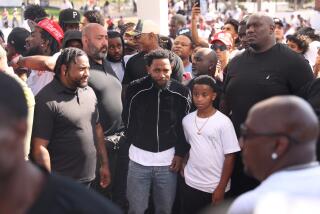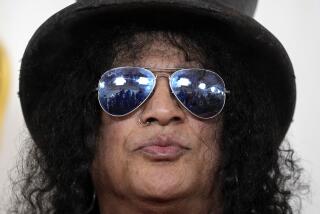‘Suge’ Knight, no stranger to legal trouble, faces most serious charges
From the beginning, Marion “Suge” Knight’s life as a rap impresario was closely intertwined with the gangster ways extolled by his artists in their music.
His first notable brush with the law came in 1993, when as a leader of Death Row Records he was charged with using a gun to attack two aspiring rappers.
Over the next 20 years, he spent stints in jail and was injured several times by gunfire, making tabloid headlines while his career diminished. He now faces the most serious charges of his life, arrested on suspicion of killing a 55-year-old man after getting into an argument during the filming of a commercial for an upcoming movie about the early days of rap in Compton, where he grew up.
RELATED: In Compton, Suge Knight incidents bring dismay, anger
On Friday, detectives from the Los Angeles County Sheriff’s Department released new details about the events leading up to the death of Terry Carter, hailed by some as a father figure for troubled young men.
Ice Cube and Dr. Dre were among the big-name rappers who had converged on the area to film a commercial for “Straight Outta Compton,” a biopic about N.W.A., a seminal group from the early days of the genre.
On the set Thursday, sheriff’s deputies asked Knight, 49, to leave after he began arguing with another man, Cle “Bone” Sloan, Lt. John Corina said.
Later, at Tam’s Burgers at Central and East Rosecrans avenues, Knight was in his red Ford F-150 Raptor when he and Sloan tangled again, Corina said.
While Knight was still seated in his truck, he and Sloan argued and exchanged punches. Knight reversed his truck, knocking Sloan to the ground, Corina said.
Knight drove forward, appearing to aim the vehicle at Sloan and Carter, who was standing next to Sloan, authorities said.
MORE: Man allegedly killed by Suge Knight was father figure in South L.A.
Carter, who detectives say was not involved in the argument, died at the scene. Sloan, 51, who appeared in “Training Day” with Denzel Washington and is also a filmmaker and activist against gang violence, was said to be stable and was expected to survive.
After striking the men, Knight drove off without notifying authorities, Corina said.
According to the California Department of Motor Vehicles, Knight had a hold on his driver’s license and was not allowed to renew it because of an outstanding issue. In the past, his license had been suspended for failure to appear in court.
Knight’s attorney, James E. Blatt, described Carter as a good friend of Knight who was trying to break up the fight.
Blatt contradicted the detectives’ narrative, saying that Knight went to Tam’s Burgers at Carter’s invitation. There, according to Blatt, Knight was attacked by four men, including Sloan, and was trying to escape, fearing for his life, when he ran over Carter and Sloan.
“I’ll say this—when someone is attacking you in the vehicle, grabbing at the steering wheel, you don’t have the best control of your vehicle,” Blatt said.
Knight was heartbroken when he learned Carter had died, Blatt said. The two had known each other since the 1980s and were in business together for a time.
Early Friday, Knight turned himself in for questioning at the West Hollywood sheriff’s station. Within hours, he was booked on suspicion of murder and remained in the Men’s Central Jail while Blatt tried to obtain $2 million in bail.
Filming the “Straight Outta Compton” commercial was a celebratory occasion for a city that was once known for gang violence but has recently seen new business investment as well as a decrease in homicides.
FROM THE ARCHIVES: Suge Knight’s empire has dwindled, but he sees only possibilities
The music that propelled Knight and others into stardom also cast Compton in a negative light, and the city spent years trying to distance itself from the music and the rappers who made it famous. But recently, city officials have been embracing local talent.
On Wednesday night, Kendrick Lamar joined former N.W.A. members Ice Cube and Dre — all Compton natives — to film the commercial at Tam’s Burgers, said Janna Zurita, a Compton councilwoman.
Zurita brought local children to the set to meet Dre, Compton’s first billionaire.
The next day, filming continued at a local barbershop with the addition of another native son, the rapper known as The Game. The crew headed to Compton City Hall and continued shooting outside until breaking for lunch, said Zurita, who left after the morning session.
“It was such a joyous event,” Zurita said. “Dre was in the neighborhood. The community was out. How could something so good turn so sour?”
With three superstars in one place, security was tighter than during the filming of the movie itself, Zurita said. Last summer, there was a drive-by shooting during the filming.
“The acts of one man do not derail the movement we are doing here in Compton,” Compton Mayor Aja Brown said. “Thank you to Dr. Dre, Ice Cube, Universal Studios, and the Grammys for telling the story of what Compton was and is becoming.”
On Friday, the lunchtime rush proceeded as usual at Tam’s Burgers. Some whispered about the fatal hit-and-run.
Before the incident, Mikal Henderson, 62, said the publicity surrounding the film had him feeling good about his adopted hometown. But now he fears this tragedy will remind outsiders of Compton’s troubled days.
MORE: Suge Knight remains stuck in a gangsta rap past
“They are not going to know anything about the jobs being created and the other construction projects,” Henderson said as he sat outside Tam’s. “When people think of Compton, they get imagery of way back. They don’t see the positive stuff going on right now.”
The founder and owner of Heavyweight Records, Carter helped young men make a transition out of gang life, even giving them advice on how to invest their money in legitimate businesses, a longtime friend said Friday.
“As young black men, we don’t have many people that help us,” Darcell Carraway said. “This is a big loss.”
Sloan, a former member of the Athens Park Bloods, directed the 2005 HBO documentary “Bastards of the Party” about gang life in Los Angeles.
Jermaine Shelton, his manager, said he is “doing fine” and was recovering at the hospital.
Knight co-founded Death Row Records, the first rap label to consistently dominate the pop scene, with Dre in 1991.
Death Row’s artists included Snoop Dogg, Tupac and Dre himself — men presenting themselves as involved in the gangland battles they wrote about.
But while other celebrated gangster rappers have moved beyond the genre’s thug life image as they grew successful, Knight continued to find trouble.
In 1996, he was at the wheel of a BMW in Las Vegas when passenger and popular rapper Tupac Shakur was shot by gunmen in another vehicle. Shakur died a week later, and the case has not been solved.
In 1997, Knight was sentenced to nine years in prison for violating the terms of his probation from an earlier assault case.
He was released from prison in 2001 but was sent back to jail two years later for violating parole when he hit a parking lot attendant.
In 2006, Knight filed for bankruptcy. He put his Malibu mansion up for sale the next year.
In 2008, he was arrested in Las Vegas on suspicion of drug possession and aggravated assault. That year, he was named by the city of Compton in an injunction seeking to prevent members of the Mob Piru gang from congregating on their turf.
The next year, he pleaded guilty to misdemeanor battery.
Last August, Knight and two others were shot inside a packed West Hollywood nightclub at a pre-awards party hosted by singer Chris Brown.
Nina Bhadreshwar, who worked for Death Row Records from 1994 to 1996 and has written a trilogy of books about the label’s early days, said Knight was unable to leave his upbringing behind, becoming isolated and quick to react violently under stress.
“It’s just a shame that he carried on ... playing into the role that people have made for him,” Bhadreshwar said. “He’s playing the role in a script that people have written for him, when he’s the one who wrote it first.”
angel.jennings@latimes.com
joseph.serna@latimes.com
cindy.chang@latimes.com
Times staff writers Veronica Rocha, Gerrick Kennedy, Mikael Wood, Lorraine Ali and Ryan Parker contributed to this report.
More to Read
Sign up for Essential California
The most important California stories and recommendations in your inbox every morning.
You may occasionally receive promotional content from the Los Angeles Times.












